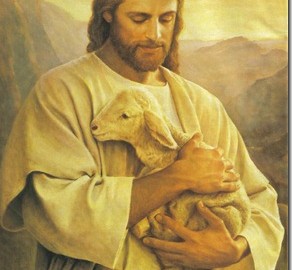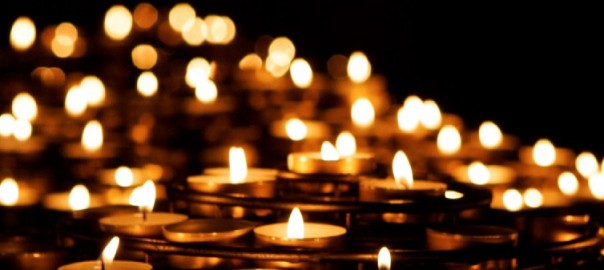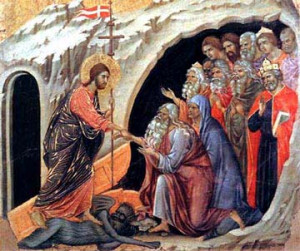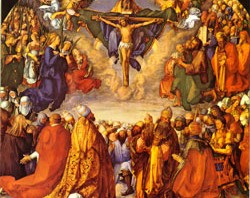How would you react if someone called you a saint? We hear that, sometimes, don’t we? When we do something good for someone, sometimes they’ll say, “Oh, thank you, you’re a saint!” But how does that make you feel? Do you bristle a bit and think, “not me!”? I think we all have that kind of reaction. Saints are the people we see in statues and hear about in amazing stories. No way could we ever be confused with people like that. More often than not, we would be likely to say to someone, “now I’m no saint…”
… As if that were a good thing. When we think about saints, we get stuck, I think, on those saints of statues and medieval stories. But today, the Church is asking us to think about saints in a broader way. Yes, we include all those “official” saints that have been canonized through the ages. The Church rejoices in the saints because when someone becomes a saint, the Church recognizes that he or she is definitely in heaven, the goal of all our lives. That’s what the process of canonization is all about. And bringing people to heaven is the whole point of the Church. So, from the many saints of every time and place, we know of thousands of people that are certainly in heaven. This illustrates that God’s will is done in the end, doesn’t it?
But, as I said, I think the Church wants us to think about saints in a broader way. There is the story of a schoolteacher who asked her children what a saint was. One little girl thought about the saints she saw in stained glass windows, and said “Saints are people the light shines through.” Think about that for a minute – that little girl isn’t far from the kingdom of God there. Because all people are called to let the light of Christ shine through them, and saints are those people who have made that the business of their lives.
Heaven is that great multitude that John the Revelator tells us about in today’s first reading: that multitude “which no one could count, from every nation, race, people, and tongue.” They are wearing, he tells us, white robes, which have been washed in the blood of the lamb. That seems very counter-intuitive, doesn’t it? Everyone knows that blood stains like nobody’s business. But he’s speaking poetically here, and recognizes that nothing washes us sinners quite as clean as the saving blood of Jesus Christ.
And that’s really the only way. Because we’re quite right when we bristle a bit at being called saints. We can’t be saints all on our own. We aren’t good enough, we can’t make up for our sins with any kind of completeness, and there’s basically no way that we can jump high enough to get to heaven. But this feast of All Saints recognizes that we don’t have to. We don’t have to because Christ has saved us through no merit of our own but based solely on God’s love for us. The fact that we can be called saints is a grace, and we dare not bristle so much that we turn away from that grace.
We are all of us on a journey, and we know that our true home is not in this place, however good it may be. We are on a journey to heaven, and that means that we are in the process of becoming saints. That journey consists in following the Way who is Jesus the Christ, our Lord and Redeemer. He has commanded, “be perfect as your heavenly Father is perfect” and there is no way to do that except to follow him.
So, no, of course, not all of us will be canonized. Most of us will go to the Kingdom rather imperfect in many ways, and will have to work that out in the grace of Purgatory. But if we look to those canonized saints for inspiration, perhaps our relationship with the Lord will lead us and our brothers and sisters to that place where all the saints worship around the Throne of the Lamb.
Today we, the Church militant, honor the Church triumphant: not only the great saints like Mary and Joseph, Patrick and Benedict, Michael and Gabriel, Francis and Dominic, but also those saints that God alone has known. We glory in their triumph that was made possible by them joining themselves to Christ. We take inspiration from their battles and from the faith that helped keep them in Christ when they could have turned away. If God could do that in their lives, he can certainly do that in ours too. Perhaps, if we are willing to accept it, he can fill us with saintly attributes: strength in weakness, compassion in the face of need, witness to faith in times when society lacks direction, and so much more.
Those virtues are virtues that we think about when we call to mind those official, canonized saints. But they are virtues for which we can and should strive as well. The desire and the grace to attain those virtues comes from God himself, and the reward for receiving that grace and living those virtues is a heavenly relationship with God. What could be better than that?
This is a lot of work, and it’s not easy to live a saintly life, but Jesus makes a promise today to those who strive to do so: “Rejoice and be glad, for your reward will be great in heaven!”





You must be logged in to post a comment.